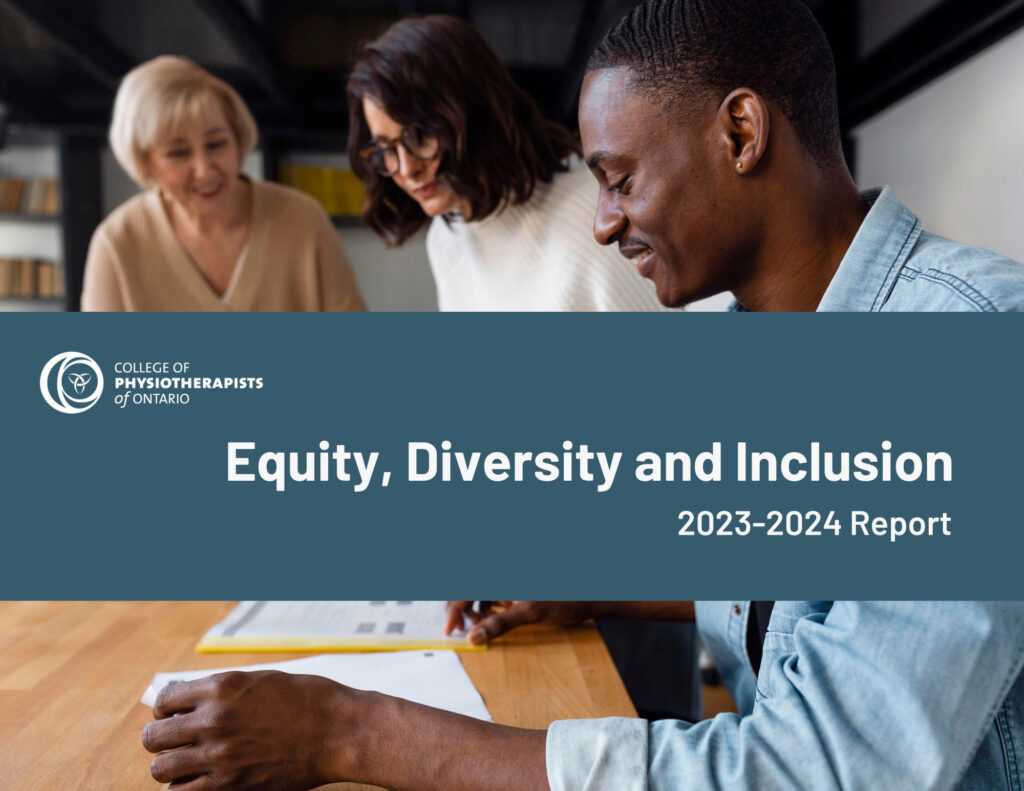Equity Diversity and Inclusion (EDI)
Territorial Acknowledgement
We acknowledge the land our office is on is the traditional territory of many nations including the Mississaugas of the Credit, the Anishnabeg, the Chippewa, the Haudenosaunee and the Wendat peoples and is now home to many diverse First Nations, Inuit and Métis peoples. We also acknowledge that Toronto is covered by Treaty 13 with the Mississaugas of the Credit.
We are honouring these lands as part of a deeper commitment to Indigenous communities in Ontario. As provincial health regulators, we have a large role to play in reconciliation to meet the broader goal of public protection.
Reconnaissance territoriale
Nous tenons à souligner que la terre sur laquelle se trouve notre bureau fait partie du territoire traditionnel des Mississaugas de Credit, des Anishinabés, des Chippewas, des Haudenosaunees et des Wendats. Aujourd’hui, ce lieu de rassemblement est le foyer de divers groupes des Premières Nations, des Inuits et des Métis. Il est également reconnu que Toronto est visée par le Traité 13 signé avec les Mississaugas de Credit.
Nous honorons ces terres dans le cadre d’un engagement plus profond envers les communautés autochtones de l’Ontario. Entant qu’organismes provinciaux de réglementation de la santé, nous avons un rôle important à jouer dans la réconciliation afin d’atteindre l’objectif plus large de la protection du public.
Statement of Awareness around Equity, Diversity, and Inclusion (EDI)
How well we achieve our mission to protect the public interest depends wholly on our ability to cultivate a climate in which everyone feels like they belong.
Advancing safe, welcoming, and equitable physiotherapy care requires that we acknowledge and address direct and systemic discrimination within our health systems and broader communities. Both types of discrimination lead to barriers that exclude many people from participating in health systems based on identity factors like race, ethnicity, gender identity and expression, sex and sexual orientation, age, ability levels, and physical appearance. Discrimination often goes unaddressed, resulting in the continued oppression and marginalization of many groups both in and out of the healthcare setting.
When systems that are meant to help people end up doing the opposite, it is not enough to be quietly anti-discriminatory: we must be actively and deliberately anti-discriminatory. It’s time for us to begin the work to do and be better.
This is an ongoing EDI journey. Our goal is to encourage participation and belonging for all, both within our organization and in the profession of physiotherapy. Right now, we are focusing on getting ourselves equipped to undergo this critical work, and we will share updates on our progress and planning as we move forward.
We are dedicated to learning about inclusive practices, growing our knowledge base, and evolving our commitment to fostering true belonging. We are humbled by the road ahead of us, and we know that this work requires community-centered decision making. We would encourage you to join us on this journey and offer your perspective. If you have any comments, questions, or ideas, please contact consultation@collegept.org.
We also recognize that doing this work honestly and productively is not easy, and that it will always be a work in progress. We look forward to learning more about ourselves and the societies in which we live along the way.
EDI Reports
A foundational pillar of the College’s strategic plan is a commitment to embrace a culture where an EDI lens is intentionally incorporated into all levels of decision making.
Our EDI Report outlines our progress toward that goal and highlights future commitments.

EDI Resources
Allyship
University of Toronto Faculty of Medicine: Microaggressions and Allyship
The Coin Model of Privilege and Critical Allyship: Implications for Health
Disability
Patients with Disabilities: Avoiding Unconscious Bias When Discussing Goals of Care
Disability Reconsidered: The Paradox of Physical Therapy
Addressing Challenges for People with Disabilities — Chapter 6 in the University of Toronto Family Medicine report “Caring for Our Diverse Populations”
Gender Equality
Women and the Workplace — How Employers Can Advance Equality and Diversity
Implicit Bias
A Framework for Integrating Implicit Bias Recognition into Health Professions Education
Implicit Bias in Health Professions: From Recognition to Transformation
Implicit Bias in Health Care
Implicit Association Test (IAT)
LGBTQ2S+
Rainbow Health Ontario Resource Library
A Guide to Gender Identity Terms
People Who Identify as LGBTIQ+ Can Experience Assumptions, Discomfort, Some Discrimination, and a Lack of Knowledge While Attending Physiotherapy: A Survey
Supporting Lesbian, Gay, Bisexual, Transgender, Transsexual, Queer, Questioning, and Two-Spirit (LGBTQ2S+) People — Chapter 12 in the University of Toronto Family Medicine report “Caring for Our Diverse Populations”
An Exploration of the Experiences of Physical Therapists Who Identify as LGBTQIA: Navigating Sexual Orientation and Gender Identity in Clinical, Academic, and Professional Roles
Students’ attitudes, beliefs and perceptions surrounding 2SLGBTQIA + health education and inclusiveness in Canadian physiotherapy programs
Microaggressions
Professionalism: Microaggression in the Healthcare Setting
Examples of Racial Microaggressions
Racism
Combating Anti-Asian Sentiment — A Practical Guide
Understanding Race, Racism and Health — Chapter 16 in the University of Toronto Family Medicine report “Caring for Our Diverse Populations”
Anti-BIPOC Racism
Time to Dismantle Systemic Anti-Black Racism in Medicine in Canada
Perspectives of Racialized Physiotherapists in Canada on Their Experiences with Racism in the Physiotherapy Profession
Diagnosing and Treating Systemic Racism
College of Physicians and Surgeons of Ontario eDialogue Article: Black Patients Matter
Anti-Indigenous Racism
Health and Health Care Implications of Systemic Racism on Indigenous Peoples in Canada
First Nations Health Authority: Cultural Safety and Humility
Cancer Care Ontario: Indigenous Relationship and Cultural Safety Courses
Acknowledging the Importance of Reconciliation for Indigenous Health and Wellbeing — Chapter 14 in Caring for Our Diverse Populations
In Plain Sight: Addressing Indigenous-specific Racism and Discrimination in B.C. Health Care
Religious-Based Care
Cultural Competence in the Care of Muslim Patients and Their Families
Cultural Religious Competence in Clinical Practice
Religious Diversity: Practical Points for Health Care Providers
Weight Bias
Weight Stigmatization in Physiotherapy: A Systematic Review
Reducing Weight Bias in Obesity Management, Practice and Policy
Obesity Management and Indigenous Peoples




